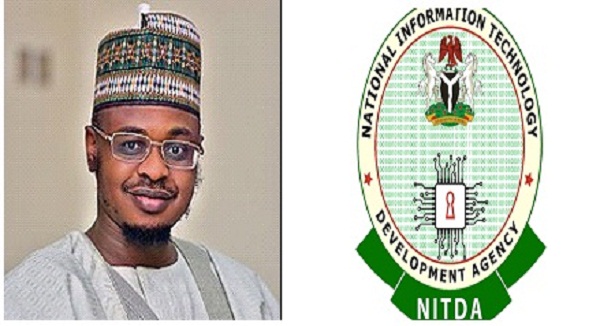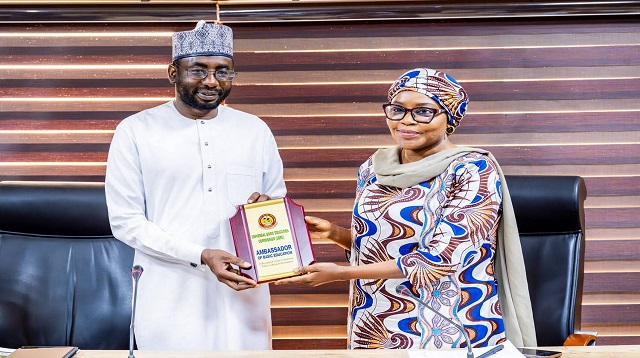E-Business
NITDA Clarifies Regulatory Infractions Allegation By ALTON

The National Information Technology Development Agency (NITDA) has cleared the air on the allegations made by Association of Licensed Telecommunication Operators of Nigeria (ALTON) that it engages on regulatory infractions.
Emmanuel Edet Esq, head, Legal Services & Board Matters, National Information Technology Development Agency, made the clarifications in a statement released on Wednesday in Abuja.
According to the statement, “The attention of the National Information Technology Development Agency (NITDA) has been drawn to a publication ascribed to the President of the Association of Licensed Telecommunication Operators of Nigeria (ALTON) published in the media regarding certain regulations and guidelines issued by the Agency.
For avoidance of doubt, NITDA has enjoyed a cordial and cooperative relationship with all sector regulators and we have consistently engaged them on all regulations and guidelines issued by the Agency. In this vein, NITDA has significantly socialized the Nigeria Data Protection Regulation (NDPR) 2019 and the Public Internet Access Regulation 2019 as referenced in the publication. The Agency is delighted with the support of several institutions in complying and promoting these regulations.
For clarity, no single regulator in Nigeria has a converged mandate on ICT in the country. Various Agencies have different roles to play in developing and regulating ICT in Nigeria as dictated by their mandates and enabling laws. Furthermore, no single entity is regulated by only one regulator in Nigeria, regulators in the country work in a cooperative and complementary capacity, resolving mandate overlaps in a cooperative manner. ALTON, as with various industry groups, are expected to comply with various professional, sector, geographical and international regulators when their operations so demand. This understanding has been shared between NITDA and other regulators in Nigeria.
It may be recalled that NITDA issued five regulatory instruments on the 25th January, 2019, two of which were referenced in the publication. We wish to draw the attention of the public to the following:
- The Framework and Guidelines for Public Internet Access(PIA) 2019 was issued to ensure the safe use of free or subsidized publicly accessible internet service in Nigeria. NITDA has been inundated by concerned stakeholders to check the regime of publicly accessible internet service considering its national security dimensions.
The Framework and Guidelines aims to create and promote a mutually beneficial and friendly environment for both public internet access providers and users in Nigeria. The Regulation is directed at Public Internet Access Providers (PIAPs). PIAPs include any business or other entity that provide internet access without charge or offers a partially subsidized internet access to members of the public. The concerns which NITDA aims to address through this regulatory instrument are:
- Cyber security and cyber crime;
- Personal data breaches; and
- Crime detection, prevention and investigation.
NITDA is enabled to address these concerns by virtue of Section 6(c) and (m) of the NITDA Act which mandates the Agency to provide Guidelines for electronic data interchange in Nigeria and to accelerate internet and intranet penetration in Nigeria and promote sound internet Governance.
- The Directives for Registration of Data Centre Facilities in Nigeria was issued pursuant to Section 6 of the NITDA Act 2007 which empowers the Agency to:
- Create a framework for the planning, research, development, standardization, application, coordination, monitoring, evaluation and regulation of Information Technology practices, activities and systems in Nigeria and all matters related thereto…;and
- Create incentives to promote the use of information technology in all spheres of life in Nigeria including the development of guidelines for setting up of information technology systems and knowledge parks.
Data Centre operations are principally information technology systems which support the entire IT value-chain. Reference to Executive Orders 003(2017) and 005(2018) mainly cites the added Presidential Directives on local content promotion. The fundamental mandate arises from the NITDA Act which has been cited above. Furthermore, the Guidelines for Nigerian Content Development in ICT (2019)explicitly provides:
Data and Information Management Companies shall:
- Register their products, capabilities and organization on the NITDA portal. The service will be provided free of charge and devoid of bureaucracy and will ensure NITDA awareness of available resources.
- Host government data locally within the country and shall not for any reason host any government data outside the country without an express approval from NITDA and the SGF.
The Nigerian Content Guidelines is a salutary example of regulatory cooperation between NITDA and ICT stakeholders to promote Local Content in Nigeria. The above provisionsanticipate the role of NITDA in the regulation and promotion of Data Centers in Nigeria. The Agency is not averse to any Regulator demanding compliance as it relates to the operation of Data Centers that touches on the Regulator’s mandate. Interestingly, Data Center operators have openly commended NITDAfor the improved enforcement of regulations and policies which has led to significant increase in Data Centre patronage in the last three years.
- The report further purports to take issues with the classification of Internet Protocol address, IMEI number, IMSI number etc. as personal data under the Regulation. The report assumes this amounted to usurpation of the NCC’s regulatory mandate. This is a patent misreading of regulatory frameworks. In the absence of a National Assembly-enacted legislation on Data Protection, Section 6 (c) of the NITDA Act 2007 specifically empowers the Agencyto:
“Develop guidelines for electronic governance and monitor the use of electronic data interchange and other forms of electronic communication transactions as an alternative to paper-based methods in government, commerce, education, the private and public sectors, labour, and other fields, where the use of electronic communication may improve the exchange of data and information.”
Furthermore, NITDA was established to implement the National IT Policy of 2000. Article 5(xix) of the Policy provides…Government will establish a National Information Technology Development Agency to implement the IT Policy, regulate, monitor, evaluate and verify progress on an ongoing basis…
Also, Strategy 13.3(iii) of the Policy further provides …Ensure the protection of individual and collective privacy, security, and confidentiality of information…
While it is global practice for sector regulators to give sector specific directives and regulations on how certain issues are to be addressed, this does not restrict the right of Government Agencies to issue regulations which cover the field as is the case in this matter. NITDA is in active collaboration with all sector regulators to ensure full compliance with the NDPR. The aggregate consensus of most stakeholders is that the NDPR is a laudable regulation which would further improve the Nigerian business environment and help attract foreign direct investment.
Finally, we advise that it is not in the strategic interest of interest groups to attempt to set Government Agencies against each other just because of its short-term benefits. NITDA is clear about its mandate as provided bythe enabling law and will not be overawed by powerful interest groups to implement its mandate which is to the overall benefit of all Nigerians.It should also be noted that violation of the Regulatory Instruments of NITDA is a criminal offence and punishable with fine, imprisonment or both.”
E-Business
AI Slows Down some Experienced Software Developers, Study Finds

Contrary to popular belief, using cutting-edge artificial intelligence tools slowed down experienced software developers when they were working in codebases familiar to them, rather than supercharging their work, a new study found.

AI research nonprofit METR conducted the in-depth study, on a group of seasoned developers earlier this year while they used Cursor, a popular AI coding assistant, to help them complete tasks in open-source projects they were familiar with.
Before the study, the open-source developers believed using AI would speed them up, estimating it would decrease task completion time by 24%. Even after completing the tasks with AI, the developers believed that they had decreased task times by 20%. But the study found that using AI did the opposite: it increased task completion time by 19%.
The study’s lead authors, Joel Becker and Nate Rush, said they were shocked by the results: prior to the study, Rush had written down that he expected “a 2x speed up, somewhat obviously.”
The findings challenge the belief that AI always makes expensive human engineers much more productive, a factor that has attracted substantial investment into companies selling AI products to aid software development.
AI is also expected to replace entry-level coding positions. Dario Amodei, CEO of Anthropic, recently told Axios that AI could wipe out half of all entry-level white collar jobs in the next one to five years.
Prior literature on productivity improvements has found significant gains: one study found using AI sped up coders by 56%, another study found developers were able to complete 26% more tasks in a given time.
But the new METR study shows that those gains don’t apply to all software development scenarios. In particular, this study showed that experienced developers intimately familiar with the quirks and requirements of large, established open source codebases experienced a slowdown.
Other studies often rely on software development benchmarks for AI, which sometimes misrepresent real-world tasks, the study’s authors said.
The slowdown stemmed from developers needing to spend time going over and correcting what the AI models suggested.
“When we watched the videos, we found that the AIs made some suggestions about their work, and the suggestions were often directionally correct, but not exactly what’s needed,” Becker said.
The authors cautioned that they do not expect the slowdown to apply in other scenarios, such as for junior engineers or engineers working in codebases they aren’t familiar with.
Still, the majority of the study’s participants, as well as the study’s authors, continue to use Cursor today.
The authors believe it is because AI makes the development experience easier, and in turn, more pleasant, akin to editing an essay instead of staring at a blank page.
“Developers have goals other than completing the task as soon as possible,” Becker said. “So they’re going with this less effortful route.”
E-Business
Firm Uncovers $500K Crypto Heist Through Malicious Packages

Kaspersky GReAT (Global Research and Analysis Team) experts have discovered open-source packages that download the Quasar backdoor and a stealer designed to exfiltrate cryptocurrency. The malicious packages are intended for the Cursor AI development environment, which is based on Visual Studio Code — a tool used for AI-assisted coding.

The malicious open-source packages are extensions hosted in the Open VSX repository that claim to provide support for the Solidity programming language. However, in practice, they download and execute malicious code on users’ devices.
During an incident response, a blockchain developer from Russia reached out to Kaspersky after installing one of these fake extensions on his computer, which allowed attackers to steal approximately $500,000 worth of crypto assets.
The threat actor behind these packages managed to deceive the developer by making the malicious package rank higher than the legitimate one. The attacker achieved this by artificially inflating the malicious package’s downloads count to 54,000.
After installation, the victim gained no actual functionality from the extension. Instead, malicious ScreenConnect software was installed on the computer, granting threat actors remote access to the infected device.
Using this access, they deployed the open-source Quasar backdoor along with a stealer that collects data from browsers, email clients, and crypto wallets. With these tools, the threat actors were able to obtain the developer’s wallet seed phrases and subsequently steal cryptocurrency from the accounts.
After the malicious extension downloaded by the developer was discovered and removed from the repository, the threat actor republished it and artificially inflated its installation count to a higher number – 2 million, compared to 61,000 for the legitimate package. The extension was removed from the platform following a request from Kaspersky.
“Spotting compromised open-source packages with the naked eye is becoming increasingly difficult. Threat actors are using increasingly creative tactics to deceive potential victims, even developers who have a strong understanding of cybersecurity risks — particularly those working in the blockchain development field.
As we expect adversaries to continue targeting developers, it is recommended that even experienced IT professionals deploy dedicated security solutions to safeguard sensitive data and prevent financial losses,” commented Georgy Kucherin, Security Researcher with Kaspersky’s Global Research and Analysis Team.
The threat actor behind the attack published not only malicious Solidity extensions but also another NPM package, solsafe, which also downloads ScreenConnect. A few months earlier, three additional malicious Visual Studio Code extensions were released — solaibot, among-eth, and blankebesxstnion — all of them have already been removed from the repository.
E-Business
NITDA Reaffirms Commitment to 95% Digital Literacy by 2030, as UBEC Pledges Collaboration

Kashifu Inuwa CCIE, the Director General of the National Information Technology Development Agency (NITDA), has reaffirmed the Federal Government’s unwavering commitment to achieving 95% digital literacy across Nigeria by the year 2030, with an ambitious milestone of 70% by 2027.

This disclosure was made in total alignment with the present administration’s priority areas of reforming the economy for sustained inclusive growth and accelerating diversification through industrialisation, digitisation, creative arts, manufacturing, and innovation.
Making this known during a collaborative meeting hosted by the Universal Basic Education Commission (UBEC), Inuwa highlighted the government’s strategic prioritisation of human capital development as central to its national transformation agenda.
“We started this journey in 2023 when President Bola Ahmed Tinubu came on board and he made it clear that economic diversification and inclusivity are part of the administration’s agenda,” he noted.
“And the president outlined this in 8 priority areas to achieve the vision, with priority number 7 specifically focused on accelerating industrialisation, digitisation, creative arts, manufacturing, and innovation,” he added.
Recognising the importance of digital fluency in achieving this agenda, he stated that NITDA is committed to investing in the digital empowerment of citizens through the development of the National Digital Literacy Framework (NDLF), a strategic blueprint aligned with international best practices.
He added that to tailor the framework to Nigeria’s specific needs, 6 core competency areas were incorporated to include device and software operations, information and data literacy, communication and collaboration, content creation, safety, and problem solving.
He explained that the framework would address all levels of digital fluency, from basic, intermediate to advanced levels, to make digital skills accessible to every Nigerian, from primary school pupils to working professionals.
According to Inuwa, despite data limitations, NITDA estimates that Nigeria’s digital literacy rate currently stands at 50%, up from 44% in 2021, based on extrapolations from the World Bank’s Better Life Report.
The NITDA DG disclosed that the agency has been working closely with the Nigerian Educational Research and Development Council (NERDC) in developing a curriculum for digital literacy, which can be infused into formal education. Stating that the visit is a continuation of NITDA’s ongoing engagements with key education stakeholders, including the Federal Ministry of Education, the National Universities Commission (NUC), and the Nigerian Educational Research and Development Council (NERDC), all aimed at advancing digital literacy across all levels of learning.
Inuwa also revealed ongoing collaborations with global platforms such as Coursera to train teachers using AI-powered lesson generation tools and provide scalable online training.
It is worth recalling that late last year, NITDA partnered with the Nasarawa State University in collaboration with CISCO in launching the Digital Learning for NSUK (DL4NSUK) initiative to enhance digital literacy in tertiary institutions, and equipping graduates with the skills needed to be digitally proficient and globally competitive.
While stressing that the entire process, from curriculum development to classroom delivery, would require a whole-of-government and whole-of-society approach, Inuwa said, “This is not a journey we can walk alone; we must bring everyone on board, education stakeholders, technology providers, state governments, and international partners.”
In response to the DG’s remarks, UBEC Executive Secretary, Hajiya Aisha Garba, confirmed that the Commission has officially received the digital literacy curriculum developed by NITDA and NERDC and has commenced internal review processes.
She acknowledged the curriculum as robust and forward-looking but stressed the need for simplification to suit early learners and teachers, citing challenges such as curriculum overload, limited teacher capacity, and inadequate infrastructure as key barriers to effective implementation.
She pledged that UBEC, in partnership with the State Universal Basic Education Board (SUBEB), will lead efforts to equip schools with computers and solar-powered infrastructure to support real learning.
“We’re committed to working with NITDA and NERDC to refine the curriculum, train teachers, and ensure effective delivery. Let us align the technical vision with grassroots realities to make a lasting impact,” she concluded.
To formalise the implementation of the meeting’s resolutions, a joint inter-agency committee was established to develop strategic plans that will ensure the effective rollout of the digital literacy initiative, to equip young Nigerians with the essential digital skills required to thrive in an increasingly dynamic and technology-driven global landscape.

 Telecom3 days ago
Telecom3 days agoNCC Speaks of Plans to Secure Telecom Infrastructure Nationwide

 General News3 days ago
General News3 days agoAirtel Nigeria Drives BFSI and Utility Sector Innovation with Industry-wide Workshop

 Telecom3 days ago
Telecom3 days agoAfrica’s Lawmakers Commit to Strengthening AI, Digital Health and Smart Manufacturing Frameworks

 E-Financial3 days ago
E-Financial3 days agoUBA Expands to More African Cities, Stamps Footprint in Saudi Arabia

 General News3 days ago
General News3 days agoEFCC Says Corrupt Politicians are Using Crypto Wallets to Launder Money

 E-Financial3 days ago
E-Financial3 days agoEcobank Plans to Raise $250m Capital Through Private Placement

 News3 days ago
News3 days agoIHS Nigeria, UNICEF Donate Oxygen Plant to Bridge Health Gap in River State

 Telecom3 days ago
Telecom3 days agoNITDA DG: AI Is an Ally for Innovation, Not an Enemy
























